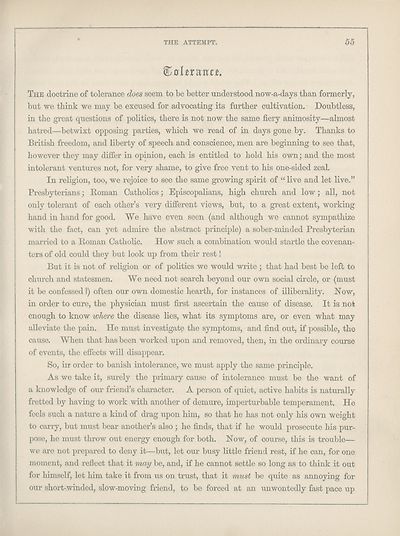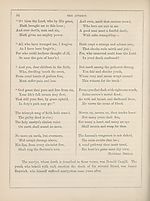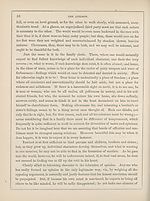Download files
Complete book:
Individual page:
Thumbnail gallery: Grid view | List view

THE ATTEMPT. 55
The doctrine of tolerance does seem to be better understood now-a-days than formerly,
but we think we may be excused for advocating its further cultivation. Doubtless,
in the great questions of politics, there is not now the same fiery animosity—almost
hatred—betwixt opposing parties, which we read of in days gone by. Thanks to
British freedom, and liberty of speech and conscience, men are beginning to see that,
however they may difier in opinion, each is entitled to hold his own; and the most
intolerant ventures not, for very shame, to give free vent to his one-sided zeal.
In religion, too, we rejoice to see the same growing spirit of "live and let live."
Presbyterians; Koman Catholics; Episcopalians, high church and low; all, not
only tolerant of each other's very difierent views, but, to a great extent, working
hand in hand for good. We have even seen (and although we cannot sympathize
with the fact, can yet admire the abstract principle) a sober-minded Presbyterian
married to a Koman Catholic. How such a combination would startle the covenan¬
ters of old could they but look up from their rest!
But it is not of religion or of politics we would write; that had best be left to
church and statesmen. We need not search beyond our own social circle, or (must
it be confessed ?) often our own domestic hearth, for instances of illiberality. Now,
in order to cure, the physician must first ascertain the cause of disease. It is not
enough to know where the disease lies, what its symptoms are, or even what may
alleviate the pain. He must investigate the symptoms, and find out, if possible, the
cause. When that has been worked upon and removed, then, in the ordinary course
of events, the eff"ects will disappear.
So, irr order to banish intolerance, we must apply the same principle.
As we take it, surely the primary cause of intolerance must be the want of
a knowledge of our friend's character. A person of quiet, active habits is naturally
fretted by having to work with another of demure, imperturbable temperament. He
feels such a nature a kind of drag upon him, so that he has not only his own weight
to carry, but must bear another's also ; he finds, that if he would prosecute his pur¬
pose, he must throw out energy enough for both. Now, of course, this is trouble—
we. are not prepared to deny it—but, let our busy little friend rest, if he can, for one
moment, and reflect that it may be, and, if he cannot settle so long as to think it out
for himself, let him take it from us on trust, that it must be quite as annoying for
our shoi-t-windcd, slow-moving friend, to be forced at an unwontedly fast pace up
The doctrine of tolerance does seem to be better understood now-a-days than formerly,
but we think we may be excused for advocating its further cultivation. Doubtless,
in the great questions of politics, there is not now the same fiery animosity—almost
hatred—betwixt opposing parties, which we read of in days gone by. Thanks to
British freedom, and liberty of speech and conscience, men are beginning to see that,
however they may difier in opinion, each is entitled to hold his own; and the most
intolerant ventures not, for very shame, to give free vent to his one-sided zeal.
In religion, too, we rejoice to see the same growing spirit of "live and let live."
Presbyterians; Koman Catholics; Episcopalians, high church and low; all, not
only tolerant of each other's very difierent views, but, to a great extent, working
hand in hand for good. We have even seen (and although we cannot sympathize
with the fact, can yet admire the abstract principle) a sober-minded Presbyterian
married to a Koman Catholic. How such a combination would startle the covenan¬
ters of old could they but look up from their rest!
But it is not of religion or of politics we would write; that had best be left to
church and statesmen. We need not search beyond our own social circle, or (must
it be confessed ?) often our own domestic hearth, for instances of illiberality. Now,
in order to cure, the physician must first ascertain the cause of disease. It is not
enough to know where the disease lies, what its symptoms are, or even what may
alleviate the pain. He must investigate the symptoms, and find out, if possible, the
cause. When that has been worked upon and removed, then, in the ordinary course
of events, the eff"ects will disappear.
So, irr order to banish intolerance, we must apply the same principle.
As we take it, surely the primary cause of intolerance must be the want of
a knowledge of our friend's character. A person of quiet, active habits is naturally
fretted by having to work with another of demure, imperturbable temperament. He
feels such a nature a kind of drag upon him, so that he has not only his own weight
to carry, but must bear another's also ; he finds, that if he would prosecute his pur¬
pose, he must throw out energy enough for both. Now, of course, this is trouble—
we. are not prepared to deny it—but, let our busy little friend rest, if he can, for one
moment, and reflect that it may be, and, if he cannot settle so long as to think it out
for himself, let him take it from us on trust, that it must be quite as annoying for
our shoi-t-windcd, slow-moving friend, to be forced at an unwontedly fast pace up
Set display mode to: Large image | Transcription
Images and transcriptions on this page, including medium image downloads, may be used under the Creative Commons Attribution 4.0 International Licence unless otherwise stated. ![]()
| Ladies' Edinburgh Debating Society publications > Attempt > Volume 3 > (69) Page 55 |
|---|
| Permanent URL | https://digital.nls.uk/104344060 |
|---|
| Attribution and copyright: |
|
|---|

